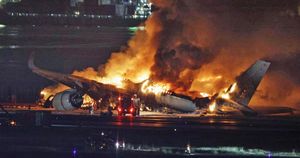Russian President Vladimir Putin has reiterated his claim about Ukrainian President Volodymyr Zelensky, asserting he is "illegitimate" and, as such, lacks the authority to sign documents or engage meaningfully in peace negotiations. This bold assertion was made during an interview with the state television channel Rossiya 1, which aired on January 28, 2025.
Putin stated, "Negotiations can be held with anyone. But due to (Zelensky's) illegitimacy he has no right to sign anything. If (Zelensky) wants to take part in talks, I will delegate people who will conduct such talks. But the key issue is the ultimate signing of the documents." Such rhetoric reflects Russia's long-standing narrative aimed at discrediting the Ukrainian government, particularly Zelensky's administration.
The backdrop of these statements is the decree issued by Zelensky on September 30, 2022, which prohibits negotiations with Putin following Russia's illegal annexation of several Ukrainian territories, including Donetsk, Luhansk, Zaporizhzhia, and Kherson. This decree is pivotal as it underlines the current stalemate and political tensions surrounding any potential peace dialogue.
Putin went on to assert, "If we start negotiations now, they will be illegitimate. There is a problem here: when the current head of the regime signed this decree (on banning negotiations), he was a legitimate president, and now he cannot revoke it." His claims rest on the belief—and the argument from some critics of Zelensky—that the constitution does not permit the extension of his presidency under martial law imposed after Russia's full-scale invasion commenced on February 24, 2022.
According to this line of reasoning, if martial law had not been implemented, the next presidential election would have taken place on March 31, 2024, and Zelensky's term would have officially concluded on May 20, 2024. Critics suggest he ceased to be legitimate by the end of this term. Yet, this interpretation has been fiercely disputed by constitutional lawyers who insist the Constitution does allow for such extensions under extraordinary circumstances.
Legal experts have stated emphatically, as major Ukrainian constitutional lawyers have pointed out, Putin's narrative about Zelensky's legitimacy is unfounded and misleading. They argue the legal framework surrounding Zelensky's position remains intact. "If there is a will, any issue of a legal nature can be resolved. But so far, we haven't seen such willingness," stated Putin, implying there must be willingness on Kyiv’s part to negotiate under the conditions he lays out.
The dichotomy between the views held by Putin and those of prominent legal experts highlights the standoff not only on the battlefield but also within legal and political realms. Zelensky's legal standing and the legitimacy of his administration continue to be at the forefront of the discourse among political analysts and experts.
Putin's remarks also echo broader geopolitical tensions, especially as he'd previously expressed his readiness to discuss issues related to the war with international figures, including former U.S. President Donald Trump. These multilateral dynamics continually infuse the narrative surrounding the conflict.
With peace talks seemingly contingent upon Zelensky's status, the situation remains complex and highly charged. The current impasse leaves little room for optimism as both sides hold firmly to their positions. Ukrainian officials have signaled their willingness to engage, yet Putin's insistence on Zelensky's alleged illegitimacy marks a significant barrier to any fruitful discourse.
Observers of international relations and conflict resolution are left to ponder whether any mediation can transpire under such severe disagreements over legitimacy and authority. The war, now continuing for nearly three years, has drawn the international community's attention, with many calling for renewed efforts toward peace and resolution.
While some analysts caution against expectations of swift resolution, the need for dialogue remains urgent. The consequences of continued hostilities are dire, impacting not just Ukraine and Russia but also regional stability and global relations.
Despite the bleak outlook, the persistent discussions surrounding peace negotiations indicate both sides recognize the necessity of addressing the conflict. The resolution may yet hinge on legal clarifications, formal negotiations, and the eventual reconciliation of both nations' claims to legitimacy. The hope for any substantial development seems hampered by the stark division over jurisdiction, authority, and the definition of legitimate governance amid martial law.



